The Makgadikgadi National Park is where the Okavango Delta finally fades into desert. The Boteti River draws a line in the sand, separating the dry Makgadikgadi from the thirst lands of the Kalahari beyond. This is the ultimate last chance for hundreds of zebras and wildebeest that crowd the water’s edge to quench a desert-drawn thirst.
The Boteti is the last finger of the Okavango Delta, reaching down to the Makgadikgadi Salt Pans. Years have passed without the river being fed a drop at all; becoming a long sandy riverbed with shrinking waterholes, where zebras jostle for space under high-flying sheets of dust. At other times, the Boteti swells up fat and full, spilling into saltpans hundreds of kilometers from its source before evaporating into thin air.
This is the place to watch plains game crashing through sharp acacia trees, gathering under lofty palms and lurking in the shade of the riverine woodland, keeping close to the water. When the Boteti River is full, big elephant bulls can often be found playing in the water and browsing in the reeds while the sun sets on the day.
Although the park’s eastern edges touch the Makgadikgadi saltpans, its unlikely you’ll see them during your stay. Where the saltpans are about landscapes, the Boteti is about a more traditional safari experience. Explore the banks by game drive, drift along the river by boat (when water levels allow), or wait for the wildlife to pass by from the sanctuary of a hide.
Once the rains arrive (October – November) the zebras and wildebeest abandon the Boteti, migrating to the saltpans and only returning in the winter (April – May). During the green season the Boteti’s banks become a quiet green landscape of technicolour sunsets and an explosion of birdlife.
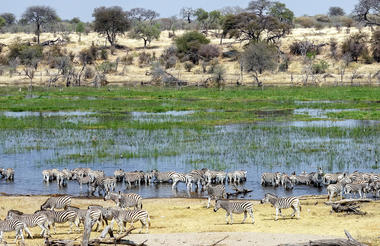
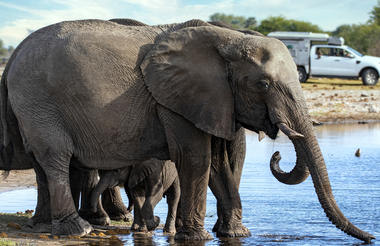
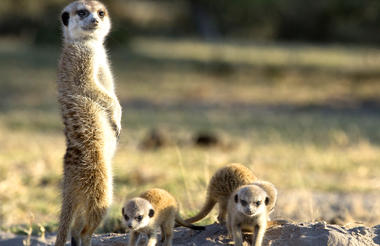
The Okavango Delta is where the wild things are: an immense, waterlogged oasis alive with elephants and birdlife, adrift in the middle of Kalahari sands. The real magic of the Delta lies in its water, trickling through from far away highlands, and spreading across the channels and floodplains.
During winter in the Kalahari, when the sun has baked the earth bare and turned the desert its driest, water fills the Okavango; transforming the floodplains into a Noah’s Ark of African wildlife.
As the water brings life to the delta, its local residents shape and recreate it. Termites slowly build mounds into islands, germinated with palm trees by passing elephants. Waterways open and close on the whim of wide-bottomed hippos, carving out channels where they crash through reeds, and leaving room behind them for exploration by mokoro.
The Okavango has many faces, which change throughout the year, prompted by that most unpredictable diva of all: the weather. Water levels rise and drop, expanding and shrinking islands, while animals move where the life is easiest and the grass greenest. In a few days, a sandy road driven by vehicle can become a waterway of unknowable depth, prompting a safari by boat instead.
Where and when you stay in the Okavango Delta will hugely influence what you do in the bush each day, the animals you’re most likely to see and finally, the safari experience you’ll have.
The delta’s watery heart is best discovered by mokoro through shallow channels and floodplains, as well as crossing the islands on foot. For less water and more of the big game, visit a camp on its drier edges (including Moremi Game Reserve and the Khwai Community Area), jump on a vehicle and seek out the animals hiding in the woodlands.
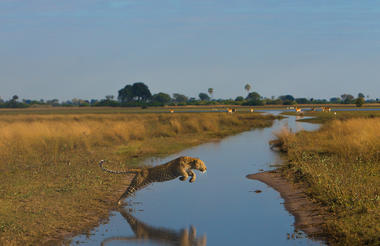
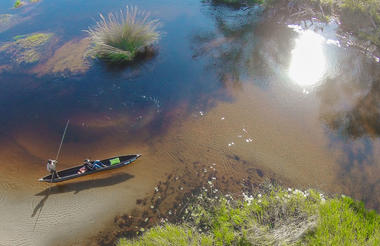
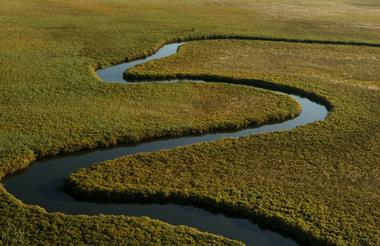
The Moremi Game Reserve is all about searching for big game; where the habitats are as diverse as the wildlife itself. Water-adapted antelopes and wary-eyed buffaloes spill out into floodplains, behind towering woodlands where leopards hide on the high branches. Dead trees cast silhouettes over elephant-filled savannas a stone’s throw from papyrus-fringed channels stretching out to the delta beyond.
When you arrive in the Moremi Game Reserve, it’s anyone’s guess what you’ll find lurking in the long grass. From wild dogs stalking waterbucks to long sunsets by a hippo-filled lagoon, the scenes will live on in memory long after the journey home.
Kick up sharp smelling clouds of dust on a morning drive, disturbing pockets of warm air in the reeds as you splash through water crossings in pursuit of a distant lion’s call. Pause by the edge of large lagoons, squinting to catch mischief making hyenas as they emerge from the trees to drink.
When you get sick of game drives, discover the channels by boat while Squacco herons fly alongside you into the wind. Watch a lazy sunset with the blue-cheeked bee eaters before returning to dry land for more hardcore bush exploration.
As Moremi Game Reserve is bound by national park rules, activities here are limited to game drives during hours of daylight with no off-roading, and boat cruises on the permanent channels.
While most of the reserve is open to the public, two private lodges sit in the Mombo Concession to the north of Chief’s Island, surrounded by the waters of the Okavango Delta. Boating isn’t possible here, instead the area offers the ultimate in dry-land game viewing. Hailed as Botswana’s predator capital, this exclusive corner is closed to outsiders and home to the big five, where the invitee list fills up years in advance.



 (1) (002)1.png?fmt=png)


 (1) (002)1.png?fmt=png)
